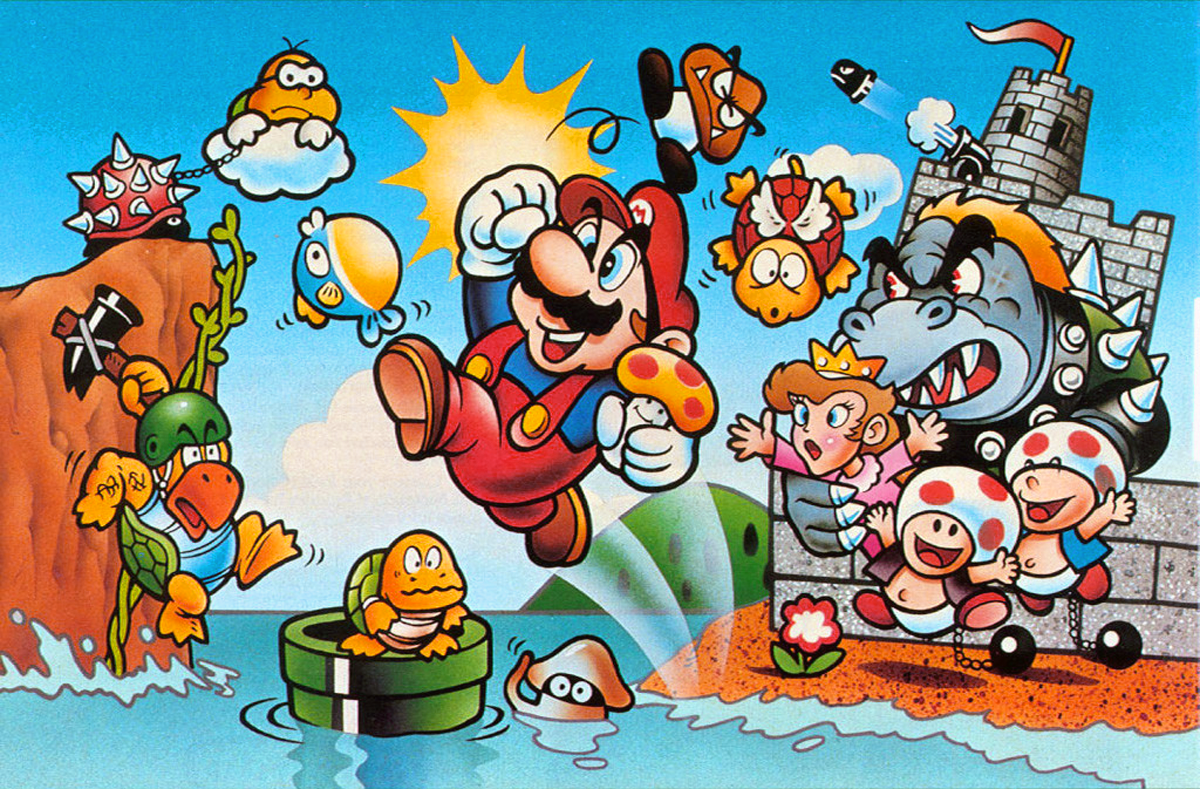You know that voice in your head? The one that’s always saying, “you probably shouldn’t say that?” That’s your conscience speaking, and it’s probably saved you from a slap in the face, or at least an awkward stare. Although society has conditioned you to (mostly) avoid situations like these, you still have to fight to keep down that other voice, the one egging you on to say and do all the wrong things for all the wrong reasons.
Video games let us turn off that voice in order to entertain our evilest notions. Innovations in open-ended gameplay and dialogue choices have made straying to the dark path more appealing than ever. But games don’t only make playing the bad guy a possibility; they use systems that reward us for indulging in our dark sides. By acting on our innate, selfish desires to survive and succeed, games let us embrace our inner evil and have fun doing it.
The Meaning Behind the Mean-ing
There is a two-way relationship between an individual player’s innate survival instincts and a game’s reward systems that enable us, make it actually possible, to play the bad guy. Many of us are taught, in some way or another, the societal differences between good and bad behavior. For example, if we act like jerks, society will respond by shunning us. However, these feelings still exist inside us because putting ourselves before others is how we survived for the first tens of thousands of years. In modern times, however, we have decades of social programming to undo when it comes to doing the “wrong” thing. In order to promote evil gameplay behavior, games have systems in place that reward, or at the very least contextualize, being the bad guy. Players need to know they are being bad and have the game reinforce that idea or else it just won’t work.

Games that offer you the choice to make good or evil decisions must show that information in a tangible way, where this showing of information is the reward itself. The Renegade/Paragon system from BioWare’s Mass Effect is a very video game-y way of expressing player alignment. It quantifies how bad or how good you are based on a point system, essentially showing you a score that tells you where you stand. Paragon points are awarded by performing charitable acts, Renegade points for selfish ones. New gameplay opportunities open up over the course of the game depending on how you play, offering different experiences for each. Threaten certain NPCs, and they may refuse to speak with you. Then again, they may feel coerced into giving you currency or items that may otherwise be unobtainable. It all results from knowing just how much of a badass you’re being and choosing to continue down that path or decide to stop doing it.
The reward for being evil can also take form as a visual representation rather than a score. In Fable by Lionhead Studios, the information could be shown through the appearance of your avatar. Doing enough good deeds could cause a golden aura to appear around your character, while bad deeds would result in a more demonic appearance. Similarly, in Lionhead’s Black & White, a game where you literally play a god, caring for your worshippers will transform your place of worship into a shining pillar circled by doves and rainbows. Conversely, plaguing your villagers and abusing them causes your temple to sprout spikes and gather flocking bats around its sinister central spire. Seeing the world change around you as in Black & White, or seeing your Renegade points increase as in Mass Effect as a result of your actions, are tangible ways to make you feel like you’re really choosing a side in the eternal conflict of good versus evil.
Looking Out for Number One
The choice to go renegade may not be a choice at all, and may instead be the result of a more subliminal desire. Games can act as sandboxes, places that are free of consequence, where you can act on your survival instincts without worry of what society will think of you. Following those innate feelings and desires to get ahead and serve your own interests can drive players to make “evil” decisions.
RPGs in particular are great at bringing these instincts to light due to their reliance on player character development, which acts as a form of mechanics-based wish fulfillment. Many RPGs let you create an ideal version of yourself in game in order to, over time, grow stronger and more experienced. This character growth makes these games ideal mediums for acting out power fantasies, letting you build someone who is not an ideal version of yourself, but someone who would approach situations in ways you would never consider in real life. These types of open-ended RPGs let you defy social norms, which goes hand in hand with why it feels so good to go the bad route.
For example: In real life, if you see an old lady drop her groceries on the ground, you’d probably feel inclined to squat down and help her gather them back up. Or maybe you’d turn a blind eye, pretend like you didn’t see anything. You probably wouldn’t kick her in the keister and laugh as she sprawls out among her applesauce and prune juice. In RPGs, that last option is totally viable, and there aren’t really any long-lasting ramifications. In Skyrim, beating up a shopkeeper will get the guards sicced on you long enough for you to escape or bribe them away. In Dragon Age: Origins, berating a peasant may lose you a bit of prestige with your present party members — or, depending on their alignment, they may agree with you and join you in the disparaging. Developers like BioWare, also behind the Mass Effect series, carefully consider how players will react to a situation, usually distilling the choices into good, evil, and neutral responses. It’s a very conscious, not to mention tidy, effort to let characters act out the player’s self-serving desires.
The World Needs a Hero
While a game’s systems allow players to be evil, a game’s plot can also encourage evil behavior. This has less to do with how a player’s choices impact a game and more to do with the way the stories are presented. By being given a character to control, players think of their character as the hero, and the stories in these games reinforce this idea. Although player choice in games like Mass Effect and Dragon Age: Origins allows players to make villains who will still be heroes, some games put players in control of the bad guys right from the start. When being bad is the whole point of a game, it’s practically impossible for players not to feel validated for their wrong-doings.

Rockstar Games has made it their creed to let players play traditionally “bad” characters. In Rockstar Games’ Grand Theft Auto series, stealing cars and starting gang wars are not only possible but are the driving force in the plot and moment-to-moment gameplay. These games let players live out their darkest fantasies by putting them in the shoes of hitmen, mobsters, hired guns, and other unsavory types that seem plucked straight out of a Martin Scorcese film. Players are placed in the shoes of characters whose goals and motivations range from eliminating rival gangs (GTA III) to exacting revenge on those who wronged you (GTA: Vice City). Although these games end in triumph for the player, all of them end in a very “bad” way — with violence and guns ablazing. The player character, who is unquestionably a person who defies social norms and morality, is by extension also the hero.
For players who relish more mundane settings, Rockstar Games’ Bully also scratches the itch of embracing the bad side but without the gang violence. Putting them in the shoes of a fifteen-year-old delinquent at a private school, Bully taps into the adolescent angst many gamers felt as kids. They’re given an outlet to indulge in their disobedient childhood fantasies by being given the ability to cut class and pick fights with the other schoolyard ne’er-do-wells. Eventually, players put a stop to these other bullies by beating them into submission — a violent end to justify the peaceful means.
Much in the way that the “good guys” are named simply by virtue of who the audience is looking at, the player character is the hero even if he or she is a morally bankrupt, murder-loving monster.
The Evil That Men Do Lives On…
Choosing the dark path has its rewards. Open-ended games can serve as create-a-villain simulators, letting you choose the way you want to dominate and destroy. But you’re also rewarded by your own emotions, those positive responses delivered by suppressed survivalist urges whenever you do something bad in-game. Together, games offer compelling experiences that make it possible for even the meekest player to feel like a diabolical overlord.
These types of games don’t condone the kind of behavior the gameplay exhibits, but instead act as outlets for our aggression and self-serving desires. They let us play dirty in a safe, harmless environment where no one gets hurt — no one real, anyway. In the name of fun, where games allow us to experience otherwise impossible scenarios, being bad in the name of fun can feel awfully good.








